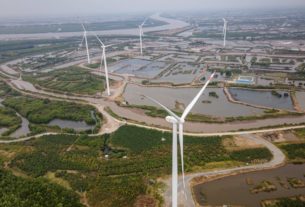
Solar power to be utilised for mass transit rail systems in Thailand
CK Power Plc (CKP) and Bangkok Expressway and Metro Plc (BEM) are collaborating to pioneer the use of solar energy for mass transit rail systems in Thailand.
The accord establishes a partnership between the two firms to provide know-how and assets to harness solar energy to partially run the MRT Chalerm Ratchamonkol Line (MRT Blue Line) and the MRT Chalong Ratchadham Line (MRT Purple Line) that, together, run for more than 71 kilometres and serve 54 stations in Bangkok and Nonthaburi.
The agreement between one of Asean’s leading producers of renewable-based electricity and the operator of two metro lines and expressways calls for 452 gigawatt-hours (GWh) to be supplied to the two MRT lines for up to 25 years.
Those volumes are equivalent to about 12% of the total anticipated consumption of the MRT lines combined, said CKP managing director Thanawat Trivisvavet.
CKP is to provide engineering expertise for system design, installation and construction as well as comprehensive post-installation maintenance service for the project that can also ready the venture for expansion.
The design work is expected to be completed by January 2024, and construction will start in February 2024.
The first delivery of electricity under commercial operations is scheduled for August 2024 for the two MRT lines, with various other phases coming on-stream through to February 2025.
Mr Thanawat said this is the first time solar energy will be used to power a Thai mass transit system on such a large scale.
“We are proud to pioneer new uses for solar energy in Thailand, and our partnership with BEM will make an important contribution to increasing the use of renewable energy sources,” he said.
BEM managing director Sombat Kitjalaksana said BEM is committed to supporting Thailand’s transition to clean energy and helping to fulfil the national goal of net zero greenhouse gas emissions by 2065.
“Under this arrangement, we can eliminate 300,000 tonnes of carbon emissions over the project period, and help us to reduce our power costs as well,” he said.
Under the agreement, six locations with a total area of over 106,000 square metres, including the roofs of rail depots, car parks and office buildings of the two MRT lines, will be used to capture solar energy.
The BEM chief described the collaboration with CKP as the start of an important partnership, adding that both parties were actively exploring ways to expand on this tie-up to substitute conventional energy with renewable energy sources for BEM’s growing power needs.
Meanwhile, Mr Thanawat said the CKP-BEM partnership has greater potential to drive Thailand’s transition to renewables, if other mass transit systems also adopt similar strategies, citing the example of the German rail system, which is the country’s largest user of renewable power.
These initiatives are in line with CKP’s 3-year goals, set in early 2022, to double its generating capacity from 2,000 megawatts to 4,800MW by 2024.
All the incremental capacity will be based on renewables such as solar, wind and hydro.
Among the large power producers of Thailand, CKP has the largest proportion of power generation capacity that is renewables-based, at 93% of installed capacity, said Mr Thanawat.
Source: https://www.bangkokpost.com/business/general/2638315


